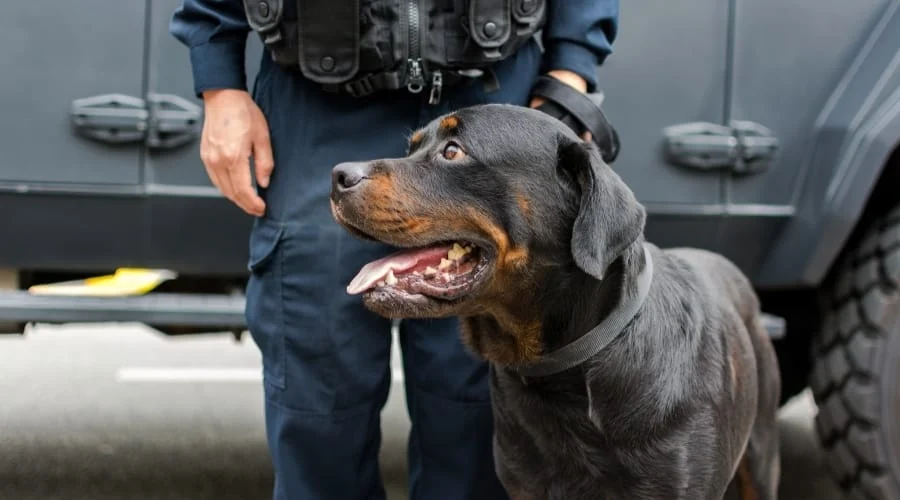Rottweilers and Their Working Abilities: How They Excel as Service Dogs
Rottweilers are often associated with their protective instincts, strength, and loyalty, but these impressive qualities also make them exceptional candidates for service dog work. Historically bred as working dogs, Rottweilers have proven themselves as versatile, highly capable animals in various roles, including as service dogs. Their intelligence, focus, and eagerness to please make them well-suited for assisting individuals with disabilities. In this article, we will explore the reasons why Rottweilers excel as service dogs and the important traits that contribute to their effectiveness in this role.
1. Natural Intelligence and Trainability
One of the key factors that make Rottweilers ideal service dogs is their natural intelligence and high trainability. This breed is known for being quick learners and is highly responsive to positive reinforcement training. Their ability to process commands and learn complex tasks makes them an excellent choice for people with a range of physical and emotional needs.
- Quick learners: Rottweilers can easily understand and perform tasks such as fetching items, opening doors, or providing assistance during mobility-related activities. Their intelligence allows them to adapt to new situations and follow a variety of commands with precision.
- Obedience and focus: This breed is known for its strong work ethic, which makes them eager to work alongside their handlers. They are not easily distracted, which is essential for maintaining focus while performing service dog tasks in busy or stressful environments.
2. Loyal and Protective Nature
Rottweilers are renowned for their loyalty and protective instincts. These traits are particularly beneficial when working as service dogs, as they provide both physical support and emotional security for their handlers.
- Loyalty to their handler: Rottweilers form strong bonds with their owners and are often fiercely devoted to their well-being. This loyalty translates into a service dog that will be consistently attentive and responsive to its handler’s needs, whether it’s assisting with mobility or providing emotional support.
- Protective instincts: Rottweilers have an innate desire to protect their families and individuals they form strong bonds with. While they are calm and well-behaved in public, their protective nature makes them excellent guardians for people with disabilities, offering an added layer of security.
3. Physical Strength and Stamina
Rottweilers are powerful and muscular dogs, traits that make them well-suited for service dog roles that require physical strength. Their size and build allow them to assist individuals with mobility challenges, such as guiding, pulling wheelchairs, or carrying out other physically demanding tasks.
- Mobility assistance: Rottweilers can be trained to support individuals with mobility impairments by providing balance support, helping them get in and out of vehicles, or pulling a wheelchair. Their strength and stamina allow them to perform these tasks without getting easily fatigued.
- Carrying heavy items: Rottweilers can be trained to carry items for their handlers, such as bags, medication, or even assisting with tasks like turning on lights or opening doors.

4. Emotional Support and Therapy Roles
Rottweilers are not only physical service dogs; their emotional sensitivity and calm demeanor make them well-suited for roles in emotional support and therapy. Their affectionate and compassionate nature enables them to provide comfort to individuals dealing with anxiety, depression, PTSD, or other mental health challenges.
- Emotional stability: Rottweilers’ calm and reassuring presence makes them perfect for emotional support work. They can be trained to provide tactile pressure therapy, helping to calm their handler during moments of stress or anxiety.
- Therapy work: Rottweilers excel in therapy settings, where they provide companionship and comfort to individuals in hospitals, nursing homes, or schools. Their gentle and friendly nature makes them approachable and trustworthy companions for those in need of emotional support.
5. Versatility in Service Dog Roles
Rottweilers are highly versatile and can be trained for a variety of service dog roles, depending on the specific needs of their handler. This adaptability makes them suitable for different types of disabilities and environments.
- Guide dogs for the visually impaired: Although not as commonly used for this role as breeds like Labrador Retrievers, Rottweilers can still be trained as guide dogs. Their ability to navigate obstacles and assist with mobility makes them capable of guiding individuals with visual impairments.
- Hearing dogs for the deaf and hard of hearing: Rottweilers’ alertness and attentiveness allow them to be trained to notify their handlers of sounds, such as alarms, doorbells, or a baby crying. Their strong bond with their owner makes them particularly effective in this role.
- Seizure alert dogs: Rottweilers have an acute sense of smell and awareness, which can be used to detect signs of an impending seizure. They can be trained to alert their handler or seek help in the event of a seizure, enhancing safety for individuals with epilepsy.
6. Socialization and Temperament for Service Work
Rottweilers are known for their calm, controlled, and friendly temperament when properly socialized. For a dog to excel as a service animal, it must be able to remain calm in various environments and around different people. Rottweilers are generally sociable and are known to be tolerant of other dogs and people when they have been raised in a positive, structured environment.
- Good with strangers: While Rottweilers are protective, they are also highly social dogs who can be trained to remain calm and friendly with strangers. Proper socialization ensures they are non-aggressive and approachable, which is essential for their role as a service dog.
- Interacting with other animals: In service dog work, it’s often necessary for dogs to be around other animals, such as in therapy environments or when accompanying their owner in public places. Rottweilers, when properly trained and socialized, tend to get along well with other pets.
7. Training a Rottweiler as a Service Dog
Training a Rottweiler as a service dog requires patience, consistency, and proper instruction. While Rottweilers are intelligent and eager to please, it’s important to work with a professional trainer who is experienced in training service dogs. Basic obedience training is essential before beginning specialized service dog training. Key training steps include:
- Basic obedience: Commands like “sit,” “stay,” “come,” and “heel” are foundational and must be well established.
- Task-specific training: Once basic obedience is mastered, the Rottweiler can be trained for specific tasks such as retrieving items, assisting with mobility, or providing emotional support.
- Public access training: Service dogs must be accustomed to behaving calmly in public places. Training will involve desensitizing them to crowded areas, loud noises, and various distractions while maintaining focus on their handler.
Conclusion
Rottweilers are not only strong, loyal, and intelligent but also excellent working dogs, making them ideal candidates for service dog roles. Their versatility, emotional sensitivity, and physical capabilities allow them to assist people with a wide range of disabilities, from mobility challenges to emotional support needs. If you’re considering a Rottweiler as a service dog, their strong work ethic and trainability will make them a valuable companion. With proper training and socialization, a Rottweiler can make a profound difference in the life of someone in need of assistance, bringing not only physical support but emotional stability and comfort.








